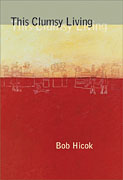
|
Bob Hicok has been producing poems at an alarming rate. This Clumsy Living is his fifth collection, and fifth in twelve years. The book continues the arc of Hicok's career, one where each volume remains clearly distinguished from its predecessor in style and wit while Hicok fearlessly alters and tunes his voice. If there's been a pattern, Hicok has favored neo-surrealism more with each book at the expense of poems more explicitly personal. Yet the true strength of Hicok has never had anything to do with what school under which critics of poetry package him. At his best, he has always fused deeply wounded moments of pathos with an oddly welcome levity, much like everybody's favorite uncle who's never afraid to tell a good joke at a funeral, even if it's his wife lying hands-clasped-together in the casket. And the same can be said of This Clumsy Living, perhaps Hicok's most obscure and mature book to date. Most notably, and with a heightened political consciousness in tow, these poems meditate on the tyranny of the human condition in the early twenty-first century. More than a few ponder the war in Iraq, while another, “Switching to deer time,” considers other atrocities and draws connections to events discussed in prior poems:
Another group of poems meditates on the home front—whether it's the invasiveness of the cyber age, our response to 9/11, or the dry spells of our aching economy. No poem better represents Hicok than “Spam leaves an aftertaste,” which pokes fun at the oddities of the Internet, and concludes:
Still, if there's a fault here, it lies in how some of the poems take Hicok's greatest strengths—the electric shifts in tone, the wacky juxtapositions—and make them merely pedestrian, almost as though Hicok were writing an impression of himself. Thankfully, this doesn't happen often, and there are more than enough classic Hicok moments—some repeating what he's already done, some opening new cans of worms—to make this a more than sufficient collection. --Jay Robinson
|
